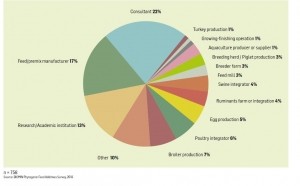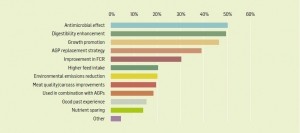Industry rates digestibility enhancement and antimicrobial effects of phytogenics

The Austrian company, which is aiming to become market leader in the fast growing product category, said results of its latest survey on PFAs show 51% of respondents use them, and 60% of those polled reported their PFA use will increase over the next 12 months.
The digestibility enhancement and antimicrobial effects of phytogenics continue to rank as the two top reasons for the application of PFAs in animal diets.
While not completely representative, the responses give the company an indication of market trends, said Michael Noonan, global product manager, phytogenics at Biomin.
The exercise of collecting and communicating these survey findings also increases awareness and deepens the industry's knowledge, he said.
Phytogenic feed additives, known as PFAs or botanicals, are substances of plant origin added to animal diets at recommended levels with the aim of improving animal performance. They comprise essential oils, herbs and spices, and are sources for bioactive ingredients such as phenols and flavonoids.
Historically, APAC has been seen the highest uptake and adoption of PFAs. South America has taken quite an interest in PFAs in recent years, said the company.
Breakdown of respondents
In total, 758 respondents from 87 countries across the world answered the survey in December 2017.
The sample group included key decision-makers, said Biomin. More than three-quarters (82%) of respondents play a role in selecting feed ingredients for their organization. The feed industry and consultants accounted for 42% of responses, followed by those working in the poultry sector (21%), including broiler and egg producers, integrators, breeders/hatcheries and turkey farms, it reported.
Biomin commissioned the online survey, which was global in range and in four languages, from an independent market research firm. Respondents replied to email invitations to respond to the survey, sent by the market research organization and also by local media partners in markets such as Brazil.
Investing in research and education
Some 11% of the respondents had used PFAs in the past but were no longer using them, while 38% had never used PFAs.
In last year’s survey, those who no longer use such products said it was because there was not enough commercial trial data or scientific studies, according to our interview with Biomin at the time.
The company said it was looking to capitalize on that uncertainty, by educating the industry, by filling in the data gaps and by continuing to invest heavily in phytogenics research and development work.
Noonan told FeedNavigator today that PFAs are the second pillar in Biomin’s growth strategy and the R&D focus reflects that:
“We are looking at things like next generation gene sequencing or how PFAs can counter inflammation in the animal or improve animal performance.”
Biomin also sought information from respondents on general trends this time out, in order to gauge the spending power of customers going forward.
“We broadened the scope of the survey this year. We asked for feedback on whether feed formulation costs are set to rise in the future, about industry profitability and on antibiotic usage,” he said.
The findings showed respondents believe that while feed formulation costs will go higher, the industry will, nonetheless, see better returns. A majority of those surveyed also think antibiotic usage will continue to decline in all regions.
Respondents in Asia Pacific cited the use of PFAs in AGP replacement more than any other region, at 51.7%, followed by Latin America (43.4%), North and Central America (32.1%) and finally Europe, the Middle East and Africa (23.5%), noted Biomin.
EMEA target of next Biomin phytogenic additive launch
Noonan said the company is planning to launch its PFA, Digestarom DC, in the EMEA region at EuroTier in November this year, said Noonan.
The additive is said to result in improved palatability, enhanced digestibility and FCR, reduced intestinal challenge, and better animal product quality.
Already introduced to the Asian market last March at VIV Asia in Bangkok, the company is also planning to target the North American and Latin America regions with the additive thereafter.
















